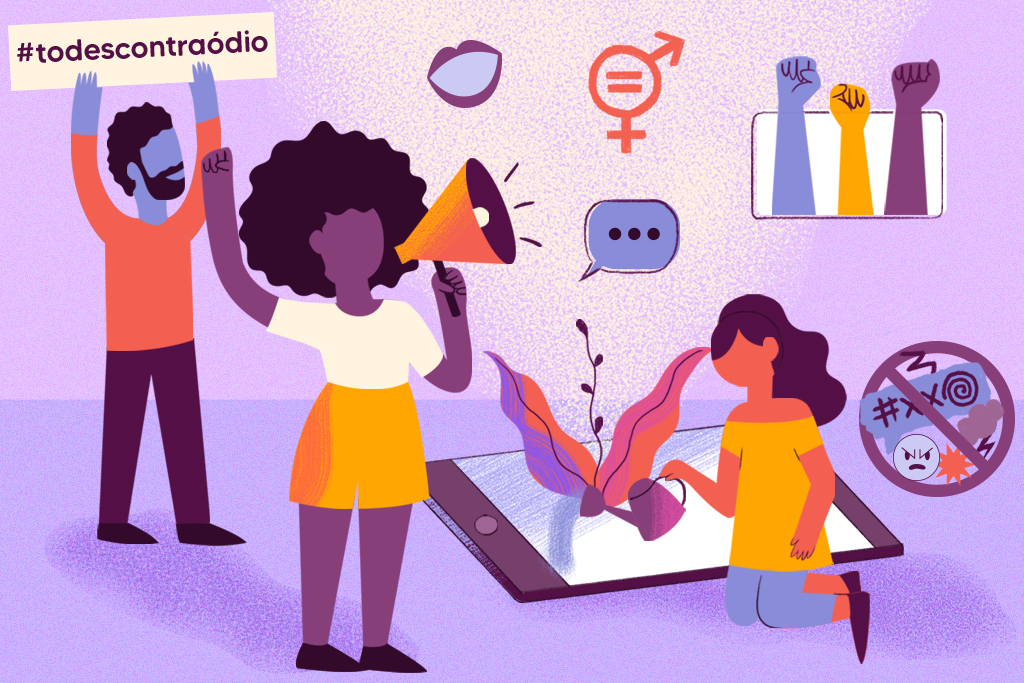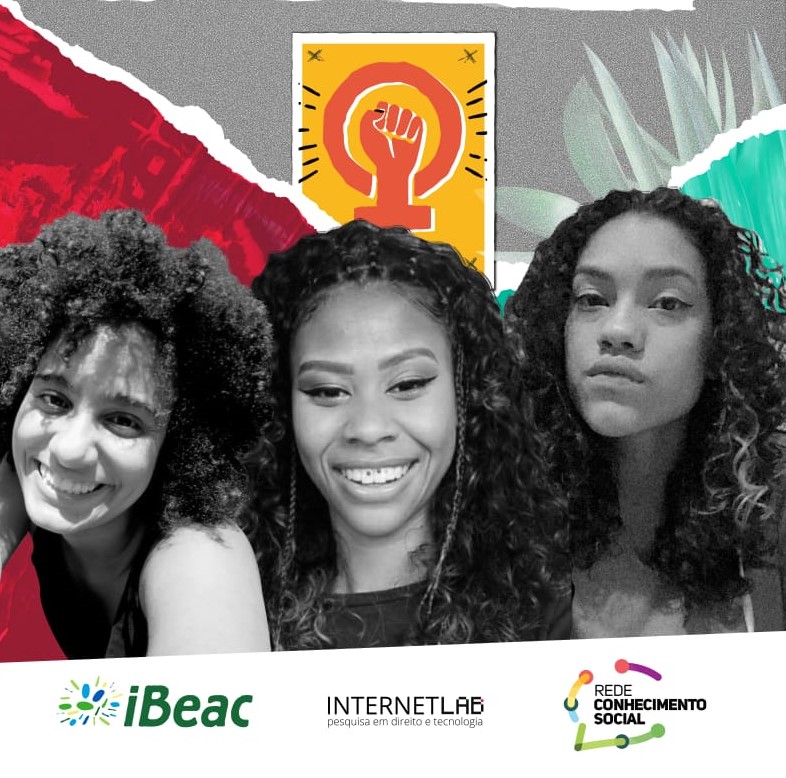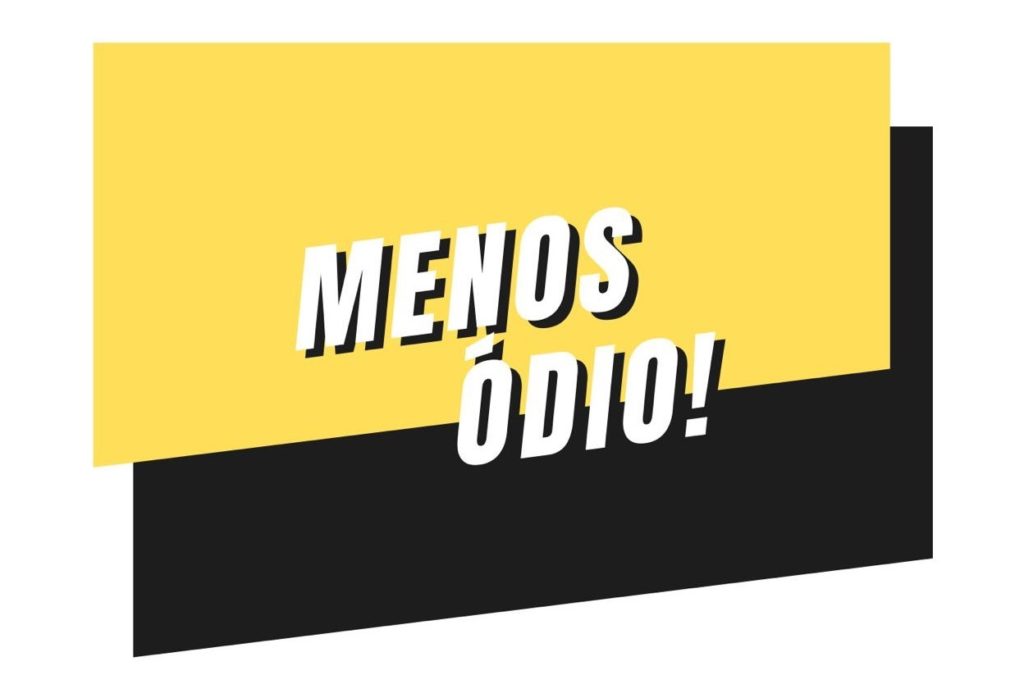
Young people lead actions to combat hate speech against women
Launched on Safe Internet Day, the action is part of the project Recognize, Resist, Remedy, done in partnership with Rede Conhecimento Social and IBEAC.
This Tuesday (9), Safe Internet Day, InternetLab, in partnership with Rede Conhecimento Social (Social Knowledge Network) and IBEAC, launches actions developed with young people from the outskirts of São Paulo to combat online hate speech against women. The activities were carried out within the scope of the Recognize, Resist and Remedy project .
Between March and December 2020, workshops were held that aimed to build a common notion of what hate speech would be and how it would affect the lives of girls and women. As a result of the meetings, after nine months of working together, young people launched three projects that explore online and offline environments to dialogue and raise public awareness about the issue.
In the process that preceded the action, the Rede Conhecimento Social (Social Knowledge Network), an organization specialized in participatory research initiatives, took action thinking about the dynamics of the workshops, mediating them and monitoring young people; while IBEAC, which works to promote rights and citizenship in different areas of the city of São Paulo, took on the role of developing parallel workshops to transform literature and hate speech into dialogue.
Fourteen young people aged between 16 and 26 years old, living in different peripheral territories of the metropolitan region of São Paulo, participated in the workshops. Each month they received important tasks to facilitate the building of mutual learning: they talked about hate speech with friends and family, produced scripts and interviewed people from different social profiles, to construct different and complementary views on the topic.

The process of the workshops culminated in a final mission that could continue the work done in recent months: the young people worked, autonomously and with the support of mentors and participating institutions, on projects that contributed socially to combat hate speech against women online.
Initiatives
The young people were divided into 3 groups and each of them developed a different proposal to dialogue with different audiences. Below, you can check each of the projects and for what reasons they were designed.
Podcast Pilotas
The objective of the project is to connect with multiple women about the complexities of gender issues, focusing on the debate on hate speech, from the perspective of young people on the periphery.

Julia Silva Gomes (17), Renata Herondina dos Santos (24) and Vitória Siqueira N. dos Santos (19) created the Pilotas podcast as a space in which their “registries” and that of other women could be shared.
“Pilotas Podcast is our voice, sharing knowledge, representation. We recognize the importance of talking about our rights, promoting and occupying our spaces,” they say.
Composed of three episodes, the programs present a chat between the presenters together with specialists around the issue of hate speech against women and the possible ways to fight it socially. The Pilotas podcasts are available on Spotify and will be published weekly throughout the month of February.
Instagram campaign
Hate speech and violent speech are sometimes naturalized socially. Not all people realize the need to take a stand or not to use violent discursive practices. Thus, dialogue is essential for the exercise of awareness.
This is the proposal of the second project: to dialogue with men of different ages and regions of the country. To do so, through a digital campaign on Instagram, they will publish weekly cards with impact phrases, accompanied by texts, which will encourage users to question their own behaviors regarding hate speech against women – the hashtag #todescontraodio accompanies all these action.

For the group, composed of Alef de Paula Santos (26), Duda Pimentel (18), Nathália Milarge (23) and Priscila Hidelfonso (17), the focus goes beyond reaching the male audience and working on the possibility of raising awareness about the theme:
“We also want the public engaged with this theme to continue promoting the action ‘all against hate speech against women’ .. Our biggest motivation is that our cards can somehow touch the audience”.
Cards can be viewed and shared on the @campanhamenosodio page.
Collage of posters around the city
Encouraged by the desire to share what was learned during the process, which started in March 2020, the third project decided to take action based on dialogue with women who walk around the city. With that, the idea of a localized action came up: paste posters with phrases that could foster reflections of women who live in their neighborhoods.

Poster design workshops were held online due to the pandemic. For Ester de Amorim Reis (20), Fernanda Santos Pereira (18) and Sara Regina da Silva Moreira (18), these project workshops enabled contact with people of different ages to share knowledge and new ideas and the posters made it possible to share this knowledge with other people.
“We want to fight hate with love, we want to fight and teach, together we are stronger”.
The processes also brought great learning. The young people added that taking part in these activities and actions was a gift to them, self – knowledge, and the ability to understand what society thinks about hate speech directed at women: ” We have learned that on social networks speech comes in various forms, sometimes even discrete, and that many women end up reproducing it, but that we can only fight to stop it being produced, if we get together and fight against it.”
The posters will be glued to different spots, in the coming months, in Barragem, Nova América, Colônia, Vargem Grande, Silveira, São Noberto and Campo Limpo neighborhoods, in the South Zone of São Paulo.
Next steps
The launch of the Pilotas podcast , cards and sticky posters is one of the faces of the project Recognize, Resist, Remedy , an initiative that has the support of the International Development Research Center and is part of a partnership with the institution IT for Change , which, in India, asks questions similar to those we have been asking here. In the coming months, the project will continue to unfold using different actions, among them, the organization of quantitative research that seeks to understand how hate speech against women has affected the lives of Brazilian women.